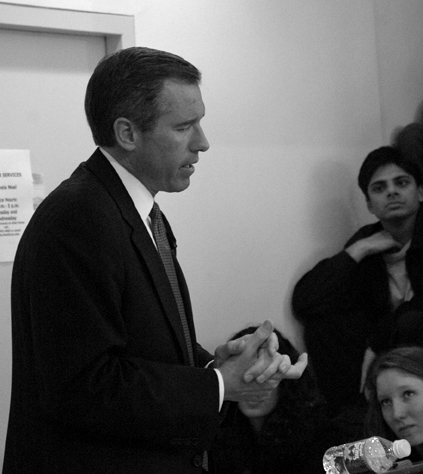Lecture: Brian Williams

Brian Williams. Photo: Laurel Angrist. © 2007 Laurel Angrist.
RELATED:
Brian Williams began his recent lecture in NYU’s journalism department on a harsh note.
“It doesn’t matter what you look like, it doesn’t matter who you know. If you can’t write that lead, then get out,” Williams said.
But Williams, who visited NYU on April 4, 2007, quickly softened the blow of this severe pronouncement — he admitted to students that his own broadcasting career had gotten off to a difficult start in Pittsburg, Kansas. “I was making $174 a week, and I bombed out after 13 months because I sucked,” Williams said.
He left Kansas for Washington, D.C., where he worked as a White House intern before snagging a job behind the scenes at a TV station. His boss there liked him and helped him improve his broadcasting skills. “You’ve got to be a hustler,” Williams said. “Anything worth wanting is worth fighting for.”
For the aspiring broadcasters in his NYU audience, Williams had some special advice. He encouraged them to maintain their own voices, rather than trying to sound the way they think a broadcaster should sound.
“Picture a focus group of people, living or dead, who you have loved in your life, and talk to them,” Williams suggested. “And if you can do that, you’ll find you’re being yourself. People have a great BS meter; it’s built in. They’ll know when they’re being taken for a ride.”
“It doesn’t matter what you look like, it doesn’t matter who you know. If you can’t write that lead, then get out.”
After years of experience in the news business, Williams said he has developed his own “strong BS meter” — he can watch the local news in any city in this country and tell you which anchors went out to dinner that night instead of staying and writing between the 6 o’clock and 11 o’clock news. Williams also said he can tell which anchors write their own copy and who’s just reading whatever pops up on the teleprompter. On The Nightly News, Williams reviews every word of the copy before it goes on the teleprompter. “Any time I’ve kicked a word, it’s because I’ve never seen it before,” Williams said.
The Nightly News attracts between 10 and 11 million viewers each night. But the playing field for prime-time nightly news is in constant motion, with NBC, CBS, and ABC jockeying for the top slot in the ratings game. The tremendous growth of online media — especially blogs — in recent years has altered the face of journalism.
“You’re going to be up against people who have an opinion, a modem, and a bathrobe,” said Williams. “All of my life, developing credentials to cover my field of work, and now I’m up against a guy named Vinny in an efficiency apartment in the Bronx who hasn’t left the efficiency apartment in two years.”
He added that it’s often difficult to judge the credibility of a blogger. “On the Internet, no one knows if you’ve been to Ramadi or you’ve just been to Brooklyn and have an opinion about Ramadi,” said Williams.

Brian Williams. Photo: Laurel Angrist. © 2007 Laurel Angrist.
Williams is certainly not anti-blog — in fact, he has his own blog, The Daily Nightly, which he updates every day. But he does worry that the explosion of opinion-driven amateur media might distract the public from big stories or important writers’ work.
“If we’re all watching cats flushing toilets, what aren’t we reading? What great writer are we missing? What great story are we ignoring? This is societal, it’s cultural, I can’t change it. … Like everybody else, I can burn an hour on YouTube or Perez Hilton without breaking a sweat. And what have I just not paid attention to that 10 years ago I would’ve just consumed?”
But these days, Williams acknowledged, if a journalist doesn’t embrace new media, he or she won’t be around for long. Williams cited the example of a reporter at The Philadelphia Inquirer who was fired recently because he refused to start a blog.
“It seems to me that if I’m in print and everything around me says ‘updated seven minutes ago,’ I’m going to want to also have been updated seven minutes ago, if not six,” said Williams. “He or she who doesn't adapt dies.”

